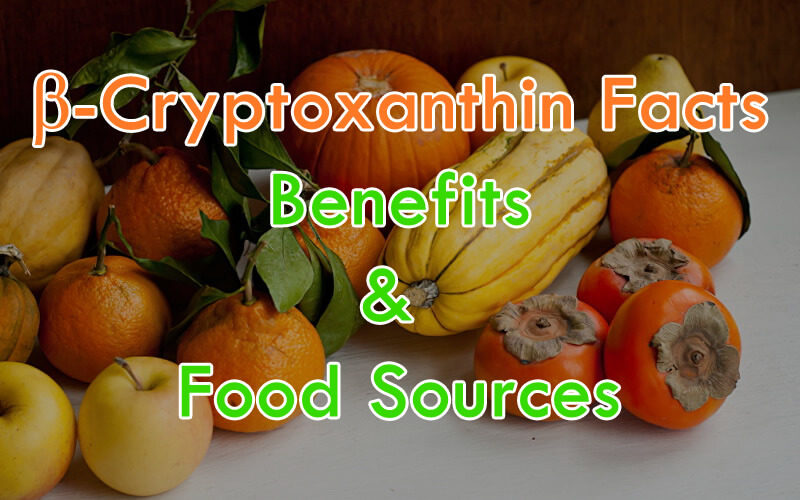β-Cryptoxanthin Facts: Benefits & Food Sources
What is beta cryptoxanthin?
Beta-Cryptoxanthin is a natural carotenoid pigment. It is one of the provitamin A carotenoids, but it is less efficient in this conversion compared to other carotenoids like beta-carotene.
β-Cryptoxanthin is naturally present in foods like orange and red bell peppers, papaya, sweet potatoes, and certain fruits such as oranges, tangerines, and persimmons. It contributes to the orange or red color of these foods.
In addition to its potential role in vitamin A synthesis, β-cryptoxanthin also has antioxidant properties, which means it can help protect cells from oxidative damage. Antioxidants can play a role in reducing the risk of chronic diseases such as heart disease, cancer, and age-related eye conditions.

What Are The Functions of Beta-cryptoxanthin?
Preventing Vitamin A Deficiency
Foods that contain beta-cryptoxanthin can help prevent vitamin A deficiency. In addition to beta-cryptoxanthin, some of the other most commonly consumed provitamin A carotenoids include beta-carotene and alpha-carotene.
Anti-cancer Properties
In recent years, carotenoids, including beta-cryptoxanthin, have received a tremendous amount of attention for their antioxidant activity as well as their potential as anti-cancer and anti-aging compounds. An increased intake of this carotenoid has been found to be associated with a reduced risk of esophageal and lung cancer. Lower levels of beta-cryptoxanthin have been found in the colonic tissues of patients who have colon polyps, while in laboratory animals, the intake of beta-cryptoxanthin was found to be protective against colon cancer. In exploring the mechanisms behind its cancer-protective activity, researchers have suggested that, in addition to its ability to quench free radicals, its benefits may be related to its potential to stimulate the expression of the RB gene, an anti-oncogene that functions to protect cells from becoming cancerous.
Enhancing Lung Function
Research suggests that beta-cryptoxanthin may promote the health of the respiratory tract. Functional tests have shown that higher serum concentrations of this carotenoid are associated with better lung function. Studies have suggested that decreased lung cancer risk is associated with higher dietary intake and higher serum levels of beta-cryptoxanthin, while people who smoke as well as those who inhale second-hand smoke have been found to have lower levels of this carotenoid.
Health Benefits of β-Cryptoxanthin
β-Cryptoxanthin offers several potential health benefits due to its status as a carotenoid with antioxidant properties and its role as a precursor to vitamin A. Some of the potential benefits of cryptoxanthin include:
1. Vitamin A Production
β-Cryptoxanthin can be converted into active retinol in the body. Vitamin A is essential for maintaining healthy vision, supporting the immune system, and promoting the growth and development of various tissues, including skin and mucous membranes.
2. Antioxidant Activity
Cryptoxanthin acts as an antioxidant, helping to protect cells and tissues from oxidative stress and damage caused by free radicals. This antioxidant function may contribute to the prevention of chronic diseases and the aging process.
3. Eye Health
As a precursor to vitamin A, cryptoxanthin can support eye health by aiding in the production of rhodopsin, a pigment found in the retina that is necessary for low-light vision. A deficiency in vitamin A can lead to vision problems, including night blindness.
4. Immune System Support
Vitamin A, derived from cryptoxanthin, plays a vital role in the immune system's functioning. Adequate vitamin A intake can help maintain the integrity of mucous membranes and enhance the body's defense against infections.
5. Skin Health
Vitamin A is known for its role in promoting healthy skin. It can help with skin cell turnover, reducing the risk of acne, and supporting overall skin health.
6. Reduced Risk of Chronic Diseases
Consuming a diet rich in cryptoxanthin-containing foods, along with other carotenoids, has been associated with a lower risk of chronic diseases such as heart disease and certain types of cancer. Antioxidants like cryptoxanthin help protect cells from oxidative damage, which is a contributing factor to these conditions.
Food Sources of Beta-cryptoxanthin
β-Cryptoxanthin is found in various fruits and vegetables. Food sources of beta-cryptoxanthin include red bell peppers, papaya, cilantro, oranges, corn, and watermelon. Below is a list of foods that are relatively high in β-cryptoxanthin:
| Foods | Amount |
| Butternut Squash | 3471mcg |
| Fuyu Persimmon | 1447mcg |
| Hot Chile Peppers | 1103mcg |
| Papaya | 589mcg |
| Sweet Red Bell Peppers | 490mcg |
| Dried Peaches | 444mcg |
| Tangerines | 407mcg |
| Cilantro | 202mcg |
| Kumquats | 193mcg |
| Yellow Sweet Corn | 161mcg |
Including these foods in your diet can help you obtain β-cryptoxanthin and other valuable nutrients. Consuming a variety of fruits and vegetables is essential for overall health, and these foods not only provide β-cryptoxanthin but also offer a range of vitamins, minerals, and antioxidants that are beneficial for your well-being.